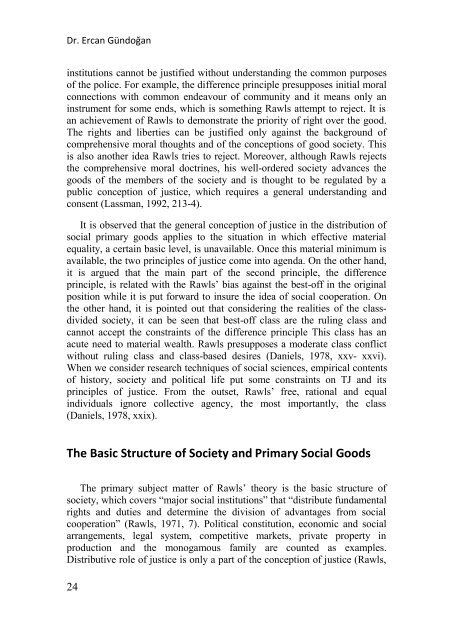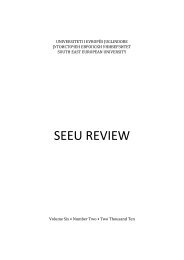SEEU Review vol. 5 Nr. 2 (pdf) - South East European University
SEEU Review vol. 5 Nr. 2 (pdf) - South East European University
SEEU Review vol. 5 Nr. 2 (pdf) - South East European University
Create successful ePaper yourself
Turn your PDF publications into a flip-book with our unique Google optimized e-Paper software.
Dr. Ercan Gündoğan<br />
institutions cannot be justified without understanding the common purposes<br />
of the police. For example, the difference principle presupposes initial moral<br />
connections with common endeavour of community and it means only an<br />
instrument for some ends, which is something Rawls attempt to reject. It is<br />
an achievement of Rawls to demonstrate the priority of right over the good.<br />
The rights and liberties can be justified only against the background of<br />
comprehensive moral thoughts and of the conceptions of good society. This<br />
is also another idea Rawls tries to reject. Moreover, although Rawls rejects<br />
the comprehensive moral doctrines, his well-ordered society advances the<br />
goods of the members of the society and is thought to be regulated by a<br />
public conception of justice, which requires a general understanding and<br />
consent (Lassman, 1992, 213-4).<br />
It is observed that the general conception of justice in the distribution of<br />
social primary goods applies to the situation in which effective material<br />
equality, a certain basic level, is unavailable. Once this material minimum is<br />
available, the two principles of justice come into agenda. On the other hand,<br />
it is argued that the main part of the second principle, the difference<br />
principle, is related with the Rawls’ bias against the best-off in the original<br />
position while it is put forward to insure the idea of social cooperation. On<br />
the other hand, it is pointed out that considering the realities of the classdivided<br />
society, it can be seen that best-off class are the ruling class and<br />
cannot accept the constraints of the difference principle This class has an<br />
acute need to material wealth. Rawls presupposes a moderate class conflict<br />
without ruling class and class-based desires (Daniels, 1978, xxv- xxvi).<br />
When we consider research techniques of social sciences, empirical contents<br />
of history, society and political life put some constraints on TJ and its<br />
principles of justice. From the outset, Rawls’ free, rational and equal<br />
individuals ignore collective agency, the most importantly, the class<br />
(Daniels, 1978, xxix).<br />
The Basic Structure of Society and Primary Social Goods<br />
The primary subject matter of Rawls’ theory is the basic structure of<br />
society, which covers “major social institutions” that “distribute fundamental<br />
rights and duties and determine the division of advantages from social<br />
cooperation” (Rawls, 1971, 7). Political constitution, economic and social<br />
arrangements, legal system, competitive markets, private property in<br />
production and the monogamous family are counted as examples.<br />
Distributive role of justice is only a part of the conception of justice (Rawls,<br />
24

















